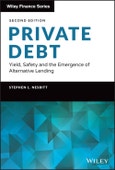In Private Debt II: Finding Yield in a Zero Interest World, renowned investment advisor and industry leader Stephen Nesbitt delivers yet another essential resource for investors seeking to acquire private debt options in the investment market, including corporate direct lending, asset-backed lending, mezzanine lending, royalties, venture debt, structured credit (CLOs), specialty finance, and structured equity.
Building on the success and popularity of Private Debt: Opportunities in Corporate Direct Lending, this latest edition of the author’s flagship text helps readers understand this complex and rapidly growing asset class. The book also offers: - Explorations of the opportunities, relevant risks, and historical yield provided by private debt - Discussions of a variety of loan investment vehicles, including the Business Development Company structure - Strategies for structuring a direct loan portfolio and how to fit it into your overall investment strategy
A can’t-miss resource for serious investors looking for opportunities to earn higher yields than those offered by traditional index funds while still retaining reasonable safety of principle and liquidity, Private Debt II will undoubtedly become the go-to guide for anyone looking for tried and tested debt investment strategies.
Table of Contents
Introduction
Acknowledgments
About the Author
Chapter 1: Overview of U.S. Middle Market Corporate Direct Lending
Chapter 2: The Historical Performance of U.S. Middle Market Direct Loans
Chapter 3: Performance Comparisons to Other Asset Classes
Chapter 4: Current Yield or Yield-to-Maturity?
Chapter 5: Comparative Credit Loss Rates
Chapter 6: How Liquid Are Direct Loans?
Chapter 7: Middle Market Loans as a Hedge Against Rising Interest Rates
Chapter 8: Credit as a Separate Asset Class
Chapter 9: Senior and Unitranche Direct Lending
Chapter 10: Loans and the Theory of Credit
Chapter 11: Risk Premiums in U.S. Middle Market Lending
Chapter 12: Covenants and the Loan Agreement
Chapter 13: Should Direct Loan Portfolios Be Leveraged?
Chapter 14: The Democratization of Alternatives
Chapter 15: Business Development Companies (BDCs)
Chapter 16: Interval and Tender Funds
Chapter 17: Selecting Direct Lending Managers
Chapter 18: Loan Valuation
Chapter 19: Investment Fees
Chapter 20: Portfolio Construction
Chapter 21: Expected Returns and Risks from Direct Lending
Chapter 22: Asset Allocation
Chapter 23: All-Weather Private Debt
Chapter 24: Enter SOFR
Chapter 25: European Middle Market Direct Lending
Chapter 26: The Borrower’s Perspective
Chapter 27: Enhanced Lending
Conclusion
Index








